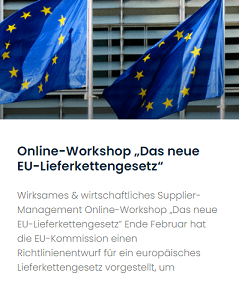News
Stay up to date with Compliance Solutions




April 18, 2024 | Winterthur, Switzerland
DACH Compliance Conference
At the DACH Compliance Conference in Winterthur, current developments and solutions relating to compliance will be discussed and debated, ranging from digitalization to cost pressure and the impact on the supply chain.
Compliance Solutions will be on site and offer a workshop on “Supply Chain Solutions”, in which we will present the Supply Chain Act, risk-based supplier auditing and our supply chain compliance software.
You are also invited to visit us at our booth, we look forward to an exciting exchange with you.
Further information on the DACH Compliance Conference, program and registration can be found here:
DACH Compliance Conference 2024





